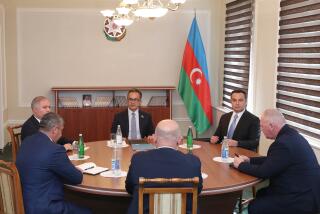Afghans Muster Fighting Spirit in Crisis With Iran
- Share via
HERAT, Afghanistan — Mullah Ajahjan Mutaasim, the commander of Afghan forces along his country’s desolate western border, considered the prospects of an Iranian attack and pursed his lips into a tiny smile.
“Do you not remember what we did to the Soviet Union?” Mutaasim, dressed in a black turban and flowing green gown, asked, referring to the former superpower’s inglorious defeat. “Afghan history is replete with examples of how our people sacrificed everything to defend their country. The Russians know this. They attacked us and got a fitting reply.”
The legendary pride that has helped make Afghanistan one of the world’s most unconquerable places is flourishing anew, sparked by an ongoing crisis with neighboring Iran. As thousands of Iranian troops mass across the border, Afghans are preparing to turn their land into the inhospitable host that has doomed so many invading armies over the centuries.
From Kabul to Kandahar, in tea shops and government ministries, Afghans invoked their victory over the Soviet Union in the 1980s as proof that size does not matter. In that struggle, the Afghans relied on their country’s deserts, mountains and medieval infrastructure to wear down a more powerful foe.
Nearly a decade after that war’s end, rusting Soviet tanks still litter the A-1 Highway here in western Afghanistan. Flanked by cliffs and menaced by bandits, the road itself is an ordeal of potholes and collapsed bridges. Every patch of road offers the possibility of ambush. Except for the meanderings of the Kutchi nomads and their camels, the terrain is without moisture or life.
Along the frontier, Afghan fighters are rushing to the mountain passes. In the villages, local leaders from the country’s ruling Taliban militia are handing out rifles to civilians. Across the country, Afghans say they are ready to put aside their raging internal quarrels to meet the threat from Iran.
“We are ready to die to defend our homeland,” said Abdul Haq, a wheat farmer in Parwana, a village near the Iranian border. “I have only my hands, but I have belief in my God.”
The crisis between Afghanistan and Iran threatens to split the Muslim world and engulf the region in a war. Although both regimes propound a fundamentalist creed, they adhere to different branches of Islam. The majority of Afghans are Sunni, while most Iranians are Shiites.
Iran and Afghanistan have been edging toward war since August, when soldiers with the Taliban killed eight Iranian diplomats and a journalist. The Iranians were killed when Taliban troops captured Mazar-i-Sharif, a city in northern Afghanistan that had been held by Afghan rebel forces, whom Iran supports.
Taliban leaders conceded that their troops killed the Iranians but maintain that the Iranians were aiding the rebels--a charge that Iran denies. The Taliban continues to hold 42 Iranians who it says were also helping the rebels.
Iran has threatened to punish Afghanistan for the killings, and it has deployed as many as 270,000 troops on the border with Afghanistan. Military exercises, which have been conducted off and on during the crisis, are scheduled to begin again within a week.
On Wednesday, both sides appeared to take their countries closer to the edge. Mutaasim, the Afghan commander, said that the Taliban has deployed about 27,500 troops in the country’s three border provinces and that more are on the way.
Iranian forces staged mock attacks just across the frontier. Iranian state television showed waves of Iranian artillery shelling imaginary targets, helicopters firing rockets and lines of soldiers charging across a dusty plain.
In Afghanistan, Taliban leaders said that, although they do not want war, they will fight back if Iran strikes. In Kabul, the Afghan capital, a gathering of the nation’s most influential religious scholars declared last week that an Iranian attack would justify an Islamic jihad--a holy war--and that the Afghans could take the war inside Iran.
“Every Afghan is a soldier,” said Maulama Mohammed Mohammadi, a Taliban leader in Kabul. “If Iran attacks, we will fight to the last man.”
In Parwana, a barren outpost of 1,000 people, the villagers say they are ready to take up arms again. Ever since the Soviet withdrawal in 1989, Afghanistan has been at war with itself, with Sunnis fighting Shiites and ethnic Pushtuns battling Tajiks, Uzbeks and Hazaras.
Like many villages in the border region, Parwana is almost entirely Uzbek, and the villagers harbor little enthusiasm for the Taliban’s fights inside the country. But the villagers say that, if the Iranians attack, they will fight together. “We are all Afghans,” one farmer said.
Despite their willingness to fight, many Afghans say they are hoping for a quiet end to the crisis.
“We are already a destroyed country,” said Mohammadi, the Taliban leader. “We have suffered war for 20 years. That is why we want peace.”
More to Read
Sign up for Essential California
The most important California stories and recommendations in your inbox every morning.
You may occasionally receive promotional content from the Los Angeles Times.










